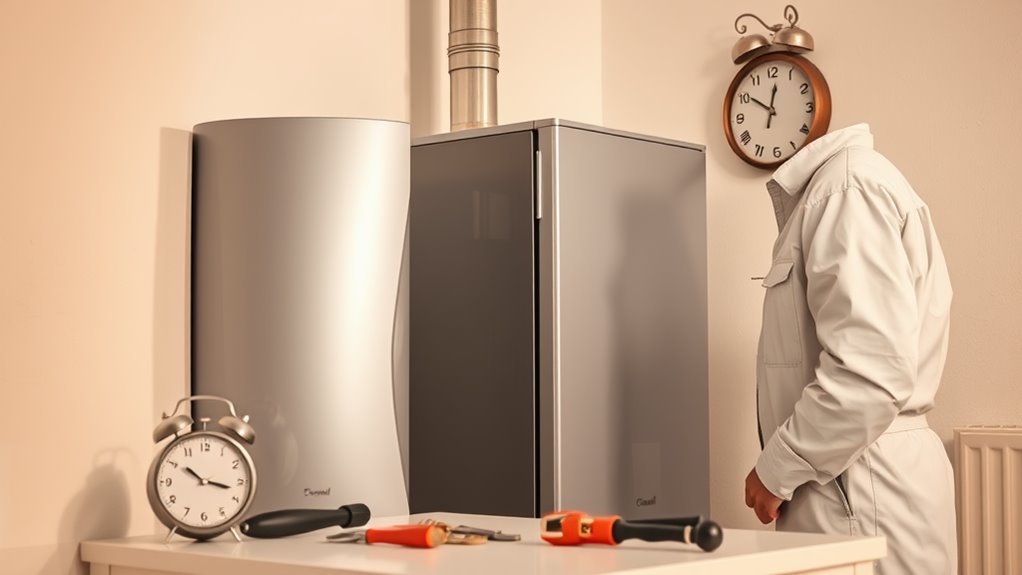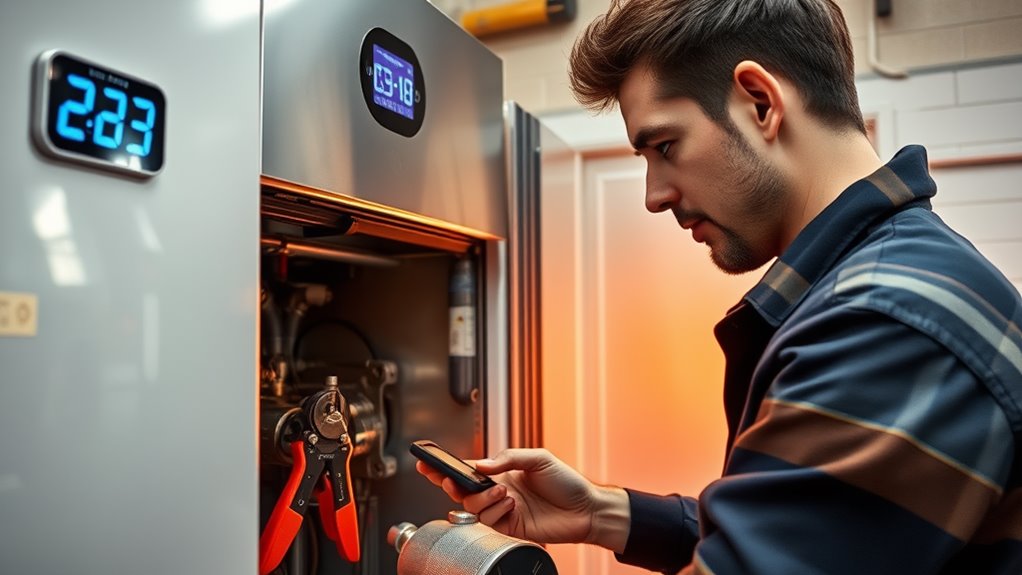A full boiler service typically takes about one to two hours. This duration can vary based on your heating system's complexity and any specific issues that arise during the inspection. Simpler systems usually require less time, while more complicated setups may take longer. Factors like the type of boiler and the technician's experience also play a role. For more insights into the benefits of regular maintenance, keep exploring further.
Key insights
- A full boiler service typically takes between one to two hours, depending on system complexity and technician findings.
- Simpler systems, like combi boilers, often require closer to an hour, while conventional and oil boilers may take longer.
- Factors like prior concerns, boiler type, and technician experience can influence the total service duration.
- Scheduling during off-peak times can help ensure flexibility and reduce wait times for service.
- Maintaining a log of past service dates and issues can aid technicians and improve overall service efficiency.
Understanding Full Boiler Service

When you schedule a full boiler service, you're ensuring your heating system operates efficiently and safely. This process involves a thorough inspection and maintenance of essential boiler components, including the heat exchanger, burner, and safety valves. Technicians will clean, test, and adjust these parts as necessary to optimize performance. Regular maintenance frequency is key to preventing breakdowns and extending your boiler's lifespan. Most experts recommend scheduling a full service at least once a year, though your specific needs may vary based on usage and system type. By adhering to this schedule, you can catch potential issues early, ensuring your boiler runs smoothly and effectively when you need it most. Additionally, routine inspections help ensure compliance with gas safety regulations, which is crucial for safe operation and risk mitigation in gas-powered systems.
Typical Duration of a Full Boiler Service

A full boiler service typically takes about one to two hours to complete, depending on the system's complexity and the technician's findings. During this service duration, the technician will perform crucial checks and adjustments, ensuring your boiler operates efficiently and safely. You'll want to schedule this service regularly to maintain an effective maintenance timeline, which can help prevent issues down the line. While straightforward systems may require closer to an hour, more complex setups could extend the service time. It's important to communicate any prior concerns or unusual behavior of the boiler to the technician, as this information might influence the service duration and overall assessment of your system's condition. Regular servicing ensures safe and efficient operation, reducing potential risks associated with boiler use.
Factors Influencing Service Time

When scheduling a boiler service, several factors can affect the time required. The type of boiler you have, the technician's experience level, and how thorough the service checklist is all play essential roles. Understanding these elements helps you set realistic expectations for service duration. Additionally, the regular maintenance of the boiler is crucial for ensuring optimal performance and can influence the time taken for the service.
Boiler Type Considerations
Different boiler types greatly impact the time it takes to complete a full service. Combi boilers typically require less time due to their compact design, while system boilers may take longer as they involve additional components. Conventional boilers can also extend service duration because of their complexity and multiple parts. Oil boilers often demand more time for servicing due to the need for specific tools and safety measures related to fuel handling. Gas boilers are generally quicker to service, but any issues with the gas supply can complicate matters. Electric boilers usually have shorter service times, but technicians must verify all electrical connections are secure and functioning properly. Ultimately, the specific boiler type influences the overall service duration considerably, and considerations for heat pump selection can further optimize energy efficiency in commercial properties.
Technician Experience Level
The experience level of the technician handling your boiler service can greatly affect the overall time required for the job. Technicians with advanced qualifications and extensive service experience typically complete tasks more efficiently. Their familiarity with various boiler models allows them to diagnose issues quickly and implement solutions without unnecessary delays. Conversely, less experienced technicians may take longer to troubleshoot and resolve problems, potentially extending the service duration. It's crucial to take into account a technician's qualifications when scheduling your service, as this directly correlates with their ability to perform the job effectively. Ultimately, investing in a skilled technician can save you time and guarantee your boiler is serviced properly, enhancing its performance and reliability. Additionally, ensuring that your technician is Gas Safe registered can provide peace of mind regarding compliance with safety standards during the service.
Service Checklist Completeness
A thorough service checklist plays an essential role in determining how long your boiler service takes. The completeness of this checklist directly impacts service quality and efficiency. Here's what influences the time required for your boiler service:
- Verification of boiler type and model
- Inspection of safety controls and devices
- Cleaning and maintenance of components
- Testing gas pressure and flow
- Assessment of overall system performance
When technicians adhere to a detailed checklist, they guarantee that no critical aspects are overlooked. This not only enhances service quality but also minimizes the risk of future issues. Regular maintenance and servicing prevent boiler errors and ensure optimal performance. Remember, the checklist's importance can't be understated; a well-executed service leads to longer-lasting performance and reliability for your boiler system.
What to Expect During a Boiler Service

While you might anticipate a straightforward process, understanding what to expect during a boiler service can help you prepare effectively. During the service, a qualified technician will inspect key boiler parts, including the heat exchanger, burner, and controls. They'll check for any signs of wear, corrosion, or leaks that could affect performance. Expect the technician to clean components and adjust settings to optimize efficiency. They'll also assess the service frequency needed based on your boiler's age, usage, and manufacturer recommendations. This assessment guarantees your boiler operates safely and efficiently throughout the year. Being informed about these steps can help you feel more at ease during the service and guarantee that your boiler remains in top condition. Additionally, a thorough inspection can help ensure compliance with Commercial Gas Safety Certificate regulations.
Benefits of Regular Boiler Maintenance

Regular boiler maintenance greatly enhances safety measures by identifying potential hazards before they become serious issues. It also improves energy efficiency, helping you save on utility bills while reducing your carbon footprint. By investing in maintenance, you're ensuring your boiler operates safely and effectively. Additionally, routine checks can detect error codes early, preventing costly repairs and ensuring uninterrupted service.
Enhanced Safety Measures
Ensuring your boiler receives regular maintenance not only enhances efficiency but also greatly improves safety. Adhering to safety protocols and maintenance standards minimizes risks, protecting your home and loved ones. Here are some key benefits of regular boiler maintenance:
- Early detection of potential hazards
- Reduction of carbon monoxide risks
- Prevention of leaks and pressure issues
- Assurance that all safety devices function properly
- Compliance with legal regulations
- Regular maintenance helps prevent common error codes that could lead to costly repairs or safety concerns.
Improved Energy Efficiency
When you schedule regular boiler maintenance, you're not just safeguarding your system; you're also enhancing its energy efficiency. A well-maintained boiler operates more effectively, reducing fuel consumption and leading to significant energy savings. During maintenance, technicians perform efficiency upgrades, such as cleaning components and adjusting settings, which optimize performance. This attention to detail helps prevent energy waste, ensuring your boiler runs at peak efficiency. Over time, these small improvements can result in lower utility bills and a smaller carbon footprint. By prioritizing regular maintenance, you're investing in a reliable heating system that delivers consistent performance while maximizing energy efficiency. Additionally, regular inspections can help identify issues like low water pressure that may lead to further inefficiencies. Don't underestimate the importance of this proactive approach for both your wallet and the environment.
Tips for Scheduling Your Boiler Service
How can you make certain your boiler service goes smoothly? Here are some tips for effective scheduling:
- Plan Ahead: Don't wait for a breakdown; schedule your service during off-peak times for better scheduling flexibility.
- Communicate Clearly: Make sure you provide accurate details about your boiler to the technician for efficient service.
- Confirm Appointments: Always confirm your appointment a day prior to avoid any last-minute issues.
- Be Available: Make certain you're home during the service for direct customer communication with the technician.
- Maintain Records: Keep a log of service dates and any issues for future reference.
Following these steps will help guarantee a hassle-free boiler service experience.
Frequently Asked Questions
Can I Stay Home During the Boiler Service Appointment?
Yes, you can stay home during the boiler service appointment. It's a good idea to have your service preparation checklist ready, ensuring easy access to the boiler and any necessary information for the technician. While you're there, consider asking for boiler maintenance tips to keep your system running efficiently. Just be prepared for some noise and possible interruptions as the technician conducts their work. Your presence can also help clarify any questions.
What Qualifications Should the Service Technician Have?
When choosing a service technician, you should look for specific boiler technician certifications and gas safety qualifications. A qualified technician must have relevant training and experience to guarantee safe and efficient service. Check if they hold certifications from recognized organizations, which demonstrate their expertise in handling various boiler types. Additionally, verify they're registered with a regulatory body, as this guarantees compliance with industry standards and regulations, providing you peace of mind during the service.
How Often Should I Schedule a Full Boiler Service?
You should schedule a full boiler service annually to guarantee peak performance and safety. Regular boiler maintenance frequency helps prevent breakdowns and maintains efficiency. While considering service cost, remember that investing in annual servicing can save you money on potential repairs and energy bills in the long run. By keeping up with your boiler service, you'll enhance its lifespan and reliability, assuring a warm and comfortable home.
Will I Receive a Report After the Service Is Completed?
Yes, you'll receive a service report after your boiler service is completed. This report includes detailed findings from the technician, along with a maintenance checklist that outlines any recommendations for future care. It's essential for keeping track of your boiler's condition and ensuring compliance with safety regulations. By reviewing this report, you can stay informed about any issues and plan for necessary maintenance or repairs.
What Should I Do if My Boiler Fails the Service?
If your boiler fails the service, you should first review the technician's report to understand the issues. Then, consider your boiler repair options. You might need to schedule a follow-up service to address specific problems or discuss potential replacements if repairs aren't feasible. It's vital to act promptly to guarantee safety and efficiency in your home heating. Don't hesitate to consult the technician for advice on the best course of action.
Summary
In conclusion, a full boiler service typically takes one to two hours, depending on various factors. Understanding the process helps you prepare for the service and guarantees your boiler operates efficiently. Regular maintenance not only extends your boiler's lifespan but also enhances safety and performance. By scheduling your service proactively, you can avoid unexpected breakdowns and costly repairs. Prioritize your boiler's health, and enjoy peace of mind knowing your system's running smoothly.

